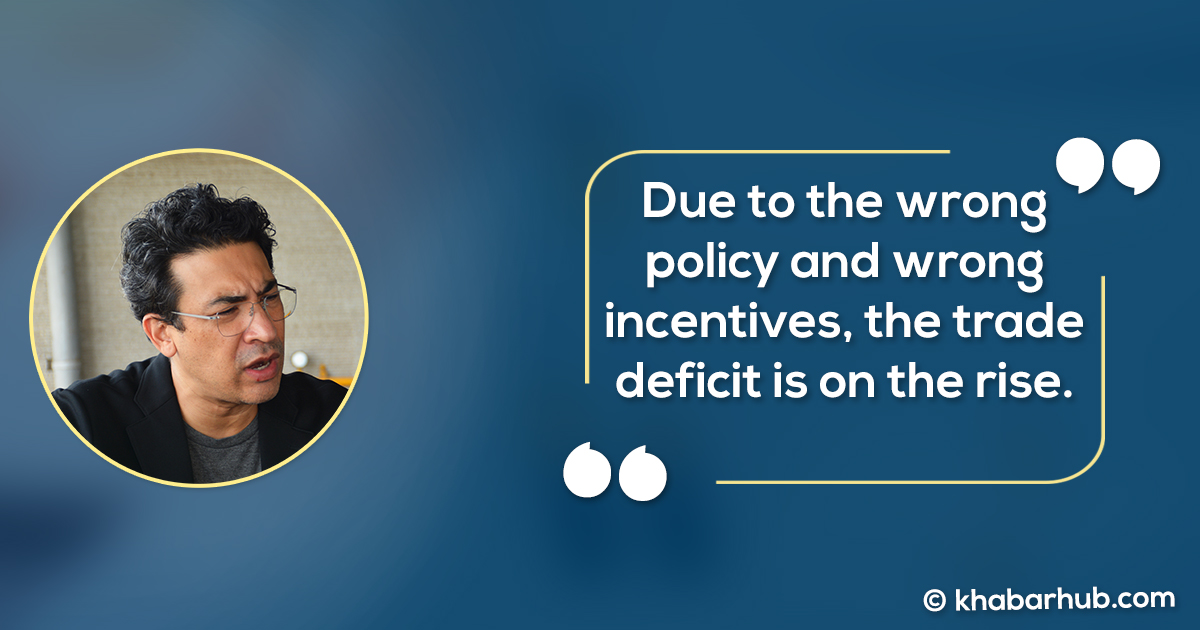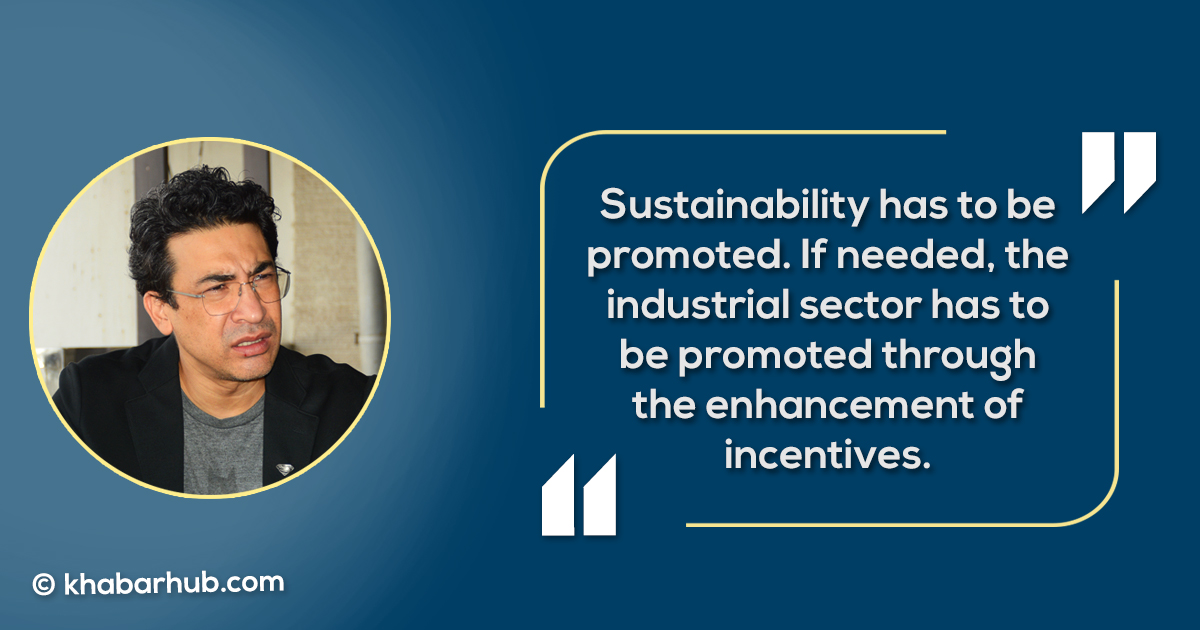Saurabh Jyoti, the Director of Jyoti Group of Companies and the Chairman of Syakar Trading Company, does not need much of answering the “who” as he is a widely recognized figure for his business
He is recognized for his business perspicacity, candor and the aptitude to accept any challenges. That’s why he has made up his mind to contest the elections of the Federation of Nepalese Chamber of Commerce and Industries (FNCCI) for the position of Vice President this time.
Deeply passionate about innovation in business, he is deeply concerned about the impact of the COVID-19 pandemic on the business sector. Khabarhub’s Govinda Luitel and Eakraj Bastola engaged in a candid conversation with Saurabh Jyoti on various issues, including the pandemic. Excerpts:
The country’s economy has come to a standstill owing to the COVID-19 pandemic. The 5-month-long lockdown and the prohibitory order that ensued have impacted the entire business sector. How do you assess the coronavirus impact on the economy and the business sector?
Coronavirus pandemic-induced lockdown has adversely hit the economic and business sectors. If you look back at the history of such impacts 10 years ago, the closure or bandhas used to incur a loss of Rs 150 billion on a daily basis.
The loss is much bigger now. Not only this, but it has impacted small, medium, and large scale industries as well.
Further, the livelihood of the ordinary people is badly affected. The loan and interest, etc., mounting every day, has taken the industrial sector to the verge of collapse, adversely impacting the national economy.
Therefore, we as industrialists have been reiterating that lockdown is not the solution to the present crisis.
The COVID-19 will not subside soon. We have to learn to live with it. We have urged the government to think about an alternative solution to restore economic pace abiding by all safety precautions and measures to prevent, curb and handle the pandemic.
Despite our repeated requests to the government against the idea of lockdown, it imposed the lockdown twice.
It has badly crushed the economy. So, we have been demanding that the industries should be allowed to resume their productions adopting measures such as social distancing and other precautionary health measures.
We have categorized the industrial sectors into three categories – least affected, affected and the most-affected. The food items, medicines, etc., come under the first category.

Likewise, in the second category comes agriculture, industry, enterprises, construction sector. And the most-impacted sectors include tourism, hotel, and travel, among others.
So, we want the government to ensure economic revival plans, addressing all sectors, some via banking sectors’ help, others through financial packages, or the government’s policies and programs.
The monetary policy has addressed our concerns to some extent. However, lockdown and prohibitory orders have still adversely affected the economy.
Former Finance Minister and currently Prime Minister’s Chief Finance Advisor Dr. Yuba Raj Khatiwada had projected Nepal’s economic growth for the fiscal year at 7% whereas ADB has predicted that it will remain around 1.5%. How do you assess it? Does it show FinMin Khatiwada too ambitious or the ADB somehow discouraged by the situation?
In fact, my observation is somewhere in between the prediction of Dr. Khatiwada and the ADB — that’s around 4.5%.
This is also very low in the current scenario. I say so because our GDP growth now is around US$1,000 which is regarded as somehow good.
After crossing US$1,000, we will upgrade ourselves from the group of least developed countries to developing ones.
As an optimist, despite the low prediction of the ADB, remittance has not decreased as feared. There were predictions that it, too, would crash.
But fortunately, it’s still on a similar range as last year. As remittance has still been contributing to the country’s economy, I am optimistic that other sectors, too, would be revived gradually if the lockdown is further relaxed and economic activities enhanced.
The consumer sector, automobile sector, construction sector, etc., will soon see their revival. The real estate, tourism, and the travel sector may, indeed, need to wait for some more time to get restored.
For instance, if, as in the Maoist insurgency period, we value the domestic tourists equally and plan packages addressing their expectations, we need not wait for it until the pandemic subsides internationally.
The conflict-era of our country had witnessed a paradigm shift in tourism. Prior to this, Nepali visitors were not regarded as tourists.
Expenses trends show that Nepali tourists also spend quite a lot during their travel. Therefore, what I mean to say is, isolating those areas with more coronavirus cases, tourism can be promoted in the areas having less or no impact.
As a guardian, the government should facilitate to make sure that all sectors perform well.
It has done something like increasing the refinancing amount from Rs 38 billion to nearly 5 times more. Though it has not been materialized, the government has given some instructions.
The government has asked the landlords to reduce the rent and asked the banks to offer some special relief packages. However, it has failed to act as a guardian on its own.
Out of 3 ‘Rs’ of monetary policy – Restructure, Refinance and Reduce – the last one is addressed in the directions to the bank, what about others?
In the Provinces, instead of helping the pandemic-hit transportation sector, the government has charged a penalty in the renewal. Similarly, the demand charge of electricity could have been waived at least of this pandemic period.
Indirectly, the government also should have played an active role to minimize the suffering rather than merely directing others to do this or that.
As a renowned entrepreneur, how do you evaluate the government’s performance on the prevention, control and treatment of the coronavirus pandemic?
I have a bit different opinion in this regard. While talking about the government’s preparation, I think the criticism made against the government is not fair.
When the USA, the UK, and other European nations, which have better infrastructures than ours, are unable to curb it, how could we do it much better with such facilities?
The resources could indeed be better utilized, more efficiently and more productively or some of the things could have been done better than this, but criticizing the government blindly is not fair.
What is your observation about the budget introduced during the coronavirus pandemic and the lockdown imposed to curb it globally? Has it addressed the woes the country as a whole and the business sector, in particular, have been facing due to the pandemic?
The budget is not private sector-friendly. We are disappointed with the budget because it has nothing substantive. The private sector is one of the prime sectors that contribute to job placement.

Despite having difficult circumstances, the budget was introduced; we endeavored to include our agendas in the monetary policy.
Most of our agendas got addressed in the monetary policy, though at the policy level. At the implementation level, we are struggling to get the policy implemented.
Do you see any specific plans and programs introduced to restore the coronavirus-ridden industrial sector to its former glory? Has the government consulted with the private sector?
Everything seems to be frustrating. For example, the government has asked the ISP internet service providers for a waiver of the internet charge; schools are asked not to take the fee, schools have to pay the building rent; the landlords are asked to waive the rent; banks are asked to reduce interest. Where is the government’s role here, where do you see the government’s relief and contribution?
It’s not the time to cane the already suffering entrepreneurs; it’s time for the government to give the incentive to help the business sector revive; but, unfortunately, the government is collecting penalties on various headings.
Consider this: A person who is asleep wakes up, but the person in a coma can’t wake up instantly. The business sector has gone to a coma due to this crisis. It takes at least six months to one year or even two years for the hard-hit sectors to revive.
Does this mean that the government does not trust the private sector? Does it show a skeptic attitude while talking to you as well?
I feel there is a lack of trust to some extent. When you talk about a lack of trust in the private sector, you have to think about three things: honor, respect and security.
For this, we need to utilize the district network and reach every district ensuring the things I mentioned earlier.
Let it be clear that taking due profit is not bad in itself. The government should not take it negatively. The business sector pays a certain amount of profit to the government.
Another thing that we need to do is resolve the complexities surrounding the refinancing. The refinancing procedure has to be facilitated. It has been taking three months even these days.
The pandemic terror still prevails. As an entrepreneur and industrialist, what’s your advice on how to go ahead with the current situation?
Firstly, it’s a matter of mindset. We got too much panicked. One of the statistics I read about the cause of global deaths each year said that every year 7 million people die due to pollution.
In South Asia, around 2 million people die of pollution-related hazards annually. There are several factors responsible for untimely deaths such as diabetes, malaria, bird flu, cold flu, etc. If we look at these statistics and compare that with the coronavirus-related statistics, we get a different perspective.
Coronavirus is now a pandemic, no doubt about it. Hence, we need to abide by health safety precautions. We should not undermine it, but there is no need to panic about it, either.
It’s true that we have to change our lifestyle, and adopt precautionary measures such as social distancing, wearing masks, etc.
We have to learn to live with it because it takes more time for the invention of medicine or vaccine. COVID-19 is a disease, and there can be some other diseases awaiting in the future as well.
So, panicking is not the solution. We have to learn to live with it and make better preparations to combat this and other future pandemics as well.
We should ensure that we are abiding by the precautionary safety measures. As preparation and preparedness for a future crisis, we have to check to see whether we have enough stock to combat such a pandemic or not.
We need to think whether our agriculture is robust enough to support us in such a crisis? The same applies to manufacturing medicines, ventilators, and producing technicians, etc.
Moreover, we need to ensure the production and supply lines, the accessibility to the market is robust. We have to make a long-term plan and assign certain roles to each sector.
It’s often been said that Nepal lacks an investment-friendly environment. The capital flight has alarmingly increased following the appointment of Dr. Yuba Raj Khatiwada as the Finance Minister. What is your observation?
In fact, most of the laws and legal provisions are not investment-friendly. The loopholes in them can be used to trap the investors and entrepreneurs at the time the authority wishes to do so. I said earlier there should be honor, respect and security for the entrepreneurs.
Another aspect is clarity in policy and effective implementation of the commitments spelled out in the policy documents.
This is lacking. Effective implementation leads towards creating job opportunities which further lead to productivity and finally productivity leads to prosperity. This is the cycle. Long-term stable policy and clarity at the policy level is a must.
Be it the PPP model or the government’s set priorities the government should ensure the investor that there is no insecurity in the country.
Do you mean that the government of nearly a two-thirds majority failed to meet the minimum expectations of the private sector?
Actually, there were expectations from the two-thirds majority government. But sadly, the government has not met those expectations.

Due to the wrong policy and wrong incentives, the trade deficit is on the rise. There are fewer risks and more rewards in trade and more risks and fewer rewards in the industrial sector.
In such a situation, how can we expect the promotion of industries and the reduction of trade deficit? The power sector, agriculture sector, IT sector are booming; that’s positive, but the GDP contribution to the industrial sector is declining.
Sustainability has to be promoted. If needed, the industrial sector has to be promoted through the enhancement of incentives.
As a young representative of a big business company, what are your agendas and programs to take a lead role in the forthcoming FNCCI election?
To me, FNCCI is a platform to work and accomplish the tasks on behalf of the Federation. All my friends in the business sector are looking at our performance.
They will evaluate us on the basis of our performance. Why should one contest for the post in FNCCI? It’s for social service; it’s to raise the issues of the private sector.
We have to raise the issues in the best interest of the nation and all entrepreneurs. It’s to address the issues of the private sector in collaboration with the government.
One should prioritize national interests and the interests of the private sector in the best interest of the government and help the government make good policies that are feasible and create an environment conducive for the private sector as well.
They say ‘every cloud has a silver lining’, what’s the silver lining of this coronavirus pandemic?
As this pandemic brought the online shopping business similar to that of amazon’s at the forefront, changed zoom into multimillion applications, it will surely bring drastic changes here as well.
In Nepal also, this pandemic will bring a drastic change in our working habits and style. It will change our purchasing habits and behavioral patterns as well.
We will go to online shopping. We will be more health conscious which means health products, health services, IT, e-commerce, economy, online education, the contactless delivery system will be booming. From physical conservatives, all will shift to online platforms. That’s a big opportunity.
Despite getting top priority, the agriculture sector seems discarded by the youths as the one that requires more investment and more risk. Do you see any possibility of getting it changed in post-COVID days?
It’s true that despite the government promises, the agriculture sector has failed to attract the young, energetic and skilled manpower.
Though there is a promising provision of soft loans or loans at low interest, the procedure is so clumsy and tiresome that only a handful of people have taken advantage of it.
It has to be changed. We should have a shift from subsistence to commercial and commercial to high-value agriculture.
There are 5 eco-zones in the 150 km long Himalayan zone. Provided we are able to explore the high potential of our diversities, we can witness miraculous changes.
High-value medicinal herbs and plants provided best utilized can pave the way for prosperity.
The automobile sector is luxurious. How has the lockdown impacted it and what impacts can it leave in the future?
While talking about the automobile sector, the lockdown has impacted it adversely. The two-wheeler, in the context of Nepal, is a necessity, not a luxury.
As it’s a necessity, there is a movement in it, though it has declined. But four-wheelers have been the worst-hit. There may be some transactions in the Dashain period.
The automobile sector alone has generated job opportunities to nearly 1.6 million people in Nepal. It creates 200 thousand jobs every year and has a transaction of nearly 100 billion per year.
If the incentive provided to assembling is increased from 25 to 50 percent, it will generate a very encouraging scenario in the country.
The assembling of parts can further be expanded to dying as well; it may grow to importing raw materials and manufacturing the parts in the long run.
Thus, the small incentive increment will make a conducive environment for more jobs and income opportunities.









Comment